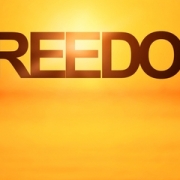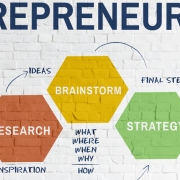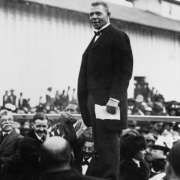In November, 2018 we launched this series by recognizing our first Poetic Justice Warrior, the classical economist who coined the term ‘entrepreneur.’ Of course, that was Jean-Baptiste Say, the father of Say’s Law of Markets as published in his 1821 A Treatise on Political Economy. It is arguably the root of all other economic law, and the precursor to economic science known reverently as the Austrian school.
One of its greatest scholars and courageous advocates was Ludwig von Mises, whose signature achievement is Human Action. The title itself gives testament to volition (free will) as a unique virtue of human consciousness. The opposite of free will is determinism, yet the classical economist who coined the term ‘capitalism’ was Karl Marx. The contradiction is stark as Marx dismissed the very free will at the core of capitalism.
Because his thinking was rooted in the labor theory of value, and social mobility was not integrated into his analysis, the fate of every individual was determined by the social class into which they were born, “The class which has the means of material production at its disposal has control at the same time over the means of mental production.”
Marx went on to label those who owned the means of production as ‘capitalists,’ as if production was an animal instinct. Yet somehow capitalists possessed mystical control over the free will of Marx’s ‘proletariat,’ at least until violent revolution deterministically takes possession of them.
It takes a Poetic Justice Warrior to clear the muck of Marxist ideology in today’s quagmire of supply-side economic disaster and political insanity. Stepping up to the challenge is the courageous economist and philosopher George Reisman. The fact that his 1979 book, Government Against the Economy on free market price theory, was praised by Friedrich Hayek and Henry Hazlitt is the only introduction necessary. As a radical for capitalism, Reisman can best speak for himself.
In this series on April 22nd it was reported that “The Wuhan virus genome was mapped earlier this year. This was not possible without capital. Capital is not possible without production. Production is not possible without human ingenuity. Human ingenuity is not possible without political freedom. Political freedom is not possible without economic freedom. Economic freedom is not possible without profit.” Yet as Reisman states in Chapter 1, Volume 1 of his 1996 book, Capitalism, A Treatise on Economics, the mother of all poetic justice is under assault,
The profit motive is attacked as the cause of starvation wages, sweatshops, monopolies, inflation, depressions, wars, imperialism, and racism. It is also blamed for poisoned foods, dangerous drugs, unsafe buildings, obsolescence, alcoholism, narcotics abuse, and crime.
America’s 2020 dominant philosophy can be described as inversion, meaning virtues are punished and vices are rewarded. For example, prisoners are being released from jail to help prevent viral infection, yet peaceful Americans are being threatened with jail for disobeying government edicts over social distancing. Mass protests and mob violence are celebrated by media and politicians while weddings, religious gatherings, and sporting events are scorned and banned.
Paradoxically, over 30 million people have filed for unemployment, millions of businesses have been crippled or destroyed, yet household income and savings rates have increased, and Reisman laments,
Saving is condemned as hoarding; competition, as the law of the jungle; and economic inequality, as the basis of class warfare. The price system’s harmony of interests are almost completely unheard of, while economic progress is held to be ravaging the planet.
Solving contradictions is the stuff of philosophers, scientists and economists. Explaining the false premises behind the contradictions, in terms that are easily understood by most people, is the stuff of Poetic Justice,
Every participant in the economy is aware of the effect of things on his own specialization. Yet he does not stop to consider their effect on other specializations. Related to the failure to look beyond one’s specialization is the confusion between money and wealth.
Here, Reisman has given us a basis for understanding, one that is relatable to people who are, or have been, employed in productive work, and he uses it to introduce the more abstract concepts of money and wealth.
In a division of labor economy, everyone is interested in earning money, and measures well-being by the money he earns. Thus, it’s easy to conclude more money is desirable, while anything that results in the average person’s earning less money is undesirable.
This describes one of the many fallacies inherent in Marxist ideology, and explains one contradiction in today’s full frontal assault on capitalism. Reisman again establishes a basis for common understanding, in this case using the social Marxist’s own reflexive faith in science,
Scientific analysis shows that while each individual is always economically best off earning as much money as the freedom of competition allows him to earn, people are not better off when earnings increase as the result of government policies of creating money.
This brings us back to the political insanity of the Wuhan virus economic lock-downs and massive government money creation. If free will is an attribute of human nature, and it is; and production is caused by reason and our will to survive, and it is; then government forced ‘stay at home orders’ destroy wealth creation and are ultimately a death sentence, which they are.
On this Road to Serfdom, Reisman concludes that productive wealth creation leads to human flourishing that is impossible to match with government money creation. He also proves the fallacy of GDP as a reliable way to measure individual and collective economic health,
Lower monetary earnings without money creation represent a higher standard of living than do higher monetary earnings with them. Even in the absence of money creation, lower national income signifies a more rapid rate of increase in wealth and improvement in human well-being than does a higher national income.
Of course, reason is an asset best reserved for reasonable people. As poetic justice also punishes vice, self-proclaimed Marxists, such as the Black Lives Matter movement, will let their deterministic, violent revolutionary instincts possess them. Precisely because independence requires great effort and is the source of human happiness, they ain’t about that.
When violent mobs funded by anarchists link arms with a major political party, local politicians, media, and corporate sponsors, it’s about submission, and Reisman understands the pathology. For example, as it related to Chile becoming the second satellite of Soviet power in the Western Hemisphere, he wrote about the death of General Pinochet in 2006,
People have an absolute right to rise up and defend their lives, liberty, and property against a Communist takeover. In the process, they cannot be expected to make the distinctions present in a judicial process.
For George Reisman, objective law in support of laissez-faire capitalism is the socioeconomic system that must be taught, promoted, and defended to the teeth. Not only did he earn his PhD in Economics from New York University under the direction of Ludwig von Mises, he was also a student of Ayn Rand.
In partnership with his wife, psychologist Edith Packer, the Reismans created the Jefferson School of Philosophy, Economics, and Psychology. Together, they organized several conferences that featured Objectivist and Austrian lecturers including philosopher Leonard Peikoff, physicist Edward Teller, economists Hans Sennholz and Walter Williams, libertarian attorney Bernard Siegan, and psychologist Edwin Locke, whose goal setting theory is a testament to free will as the essential ingredient for human civilization.













